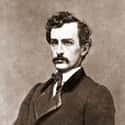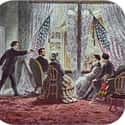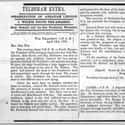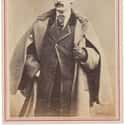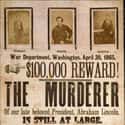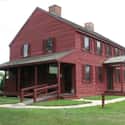-
(#1) November 1864: Booth Originally Planned To Capture Lincoln
Slaying Abraham Lincoln was not Booth's original plan. After Lincoln was re-elected president in 1864, Booth and his compatriots hoped to capture Lincoln and trade him for Confederate POWs. They first planned to grab Lincoln at Ford's Theatre, lowering him from his box to the stage with ropes. A second plot involved intercepting Lincoln in March 1865 while he was traveling, but the president's schedule changed.
With the conflict winding down and Union victory inevitable, Booth decided to take more drastic action.
-
(#2) April 14, 1865: Booth Shot Lincoln In Ford's Theatre
Booth's plan was for a group of men to take out four key Union officials on the same night: President Abraham Lincoln, Vice President Andrew Johnson, Secretary of State William Seward, and General Ulysses Grant. The organizers believed this would throw the Union into chaos, allowing the defeated Confederacy to reorganize and take Washington.
It wasn't until later that Booth learned every attempt but his own had failed; he was too focused on his mission. Using connections he had developed over the years as an actor, he got access to the presidential box on April 14, 1865, during a performance of Our American Cousin. No one noticed the handsome young actor enter the box, pull out his derringer, and point it at the back of Lincoln's head.
Booth shot Lincoln at 10:15 pm. Immediately after, he rushed past onlookers, intending to jump from the balcony to the stage. On his way, Army officer Henry Rathbone tried to stop him. After sinking his knife into Rathbone's shoulder, Booth leaped from the presidential box, landing awkwardly and seemingly breaking his leg.
There was confusion in the audience, with some bystanders saying they thought it was all part of the play until they heard Mary Todd Lincoln screaming. Onstage, Booth yelled, "Sic semper tyrannis" (Thus always to tyrants), which was the state motto of Virginia. It was also famously associated with Brutus, the man who did away with Julius Caesar. Booth had played the character onstage and might have felt a kinship with Brutus.
-
(#6) April 17, 1865: Booth Was Surprised To Learn People Weren't Praising Him
On April 17, Booth and David Herold continued to hide in the pine thicket; they stayed there for four days total. Occasionally, Thomas Jones, a friend of Samuel Cox, visited them and brought the two food, drink, and newspapers.
Booth was particularly curious to see how the world was reacting to his "heroic" act. When he saw himself roundly condemned as a coward and villain, it shocked him. In planning it, he had genuinely thought of himself as a tragic hero, like Brutus in Shakespeare's Julius Caesar.
A few days later, Booth wrote in his diary:
I am here in despair. And why? For doing what Brutus was honored for, what made [William] Tell a hero. And yet I for striking down a greater tyrant than they ever knew am looked upon as a common cutthroat.
-
(#12) April 24, 1865: Booth And Herold Arrived At Richard Garrett's Farm And Convinced Him They Were Soldiers
After taking over the home of William Lucas, Booth and David Herold forced Lucas's son to take them to Port Charles, where a former Confederate soldier, Willie Jett, had prepared a house for them. The house in question was occupied by two unmarried women, however, and the men agreed it would be improper for them to stay there.
They continued, eventually coming to a house owned by Richard Garrett on April 24. Booth managed to convince Garrett that he and Herold were soldiers and Booth's broken leg was obtained during duty. Garrett seemed to believe him and, for the first time in a week, Booth had a real bed on which to sleep.
-
(#5) April 16, 1865: Confederate Sympathizer Samuel Cox Hid Booth And Herold In A Pine Thicket
Samuel Cox received Booth and David Herold warily when they arrived at his house on April 16. While Cox supported their cause, he also knew the danger he was exposing himself to in sheltering them. So, he sent them to a nearby pine thicket at the edge of his property where they could wait for the opportunity to cross the Potomac into Virginia.
Booth spent the day fuming that they weren't allowed in Cox's house and adjusting to the uncomfortable pine thicket. It was Easter Sunday.
Meanwhile, around 1,000 Union soldiers had been mobilized in the search for Booth, and the bounty for the group was up to $100,000, the equivalent of about $1.5 million today.
-
(#3) April 14, 1865: Booth Narrowly Escaped From Washington, DC
With Abraham Lincoln lifeless, the theater in an uproar, and Union troops around every corner, Booth had to get out of Washington as quickly as possible. One of his co-conspirators had placed a horse at the stage door. Booth mounted it and rode down to the Navy Yard Bridge, which led from Washington to Maryland.
After almost being stopped at the bridge by a guard, Booth continued and met up with David Herold, another member of the group. Together, they rode to Surratt's Tavern in Surrattsville, MD (now called Clinton), where the proprietors had agreed to hide supplies for the two of them.
On the night of April 14, they rode away from the tavern, heavily armed.
New Random Displays Display All By Ranking
About This Tool
When John Wilkes Booth assassinated Abraham Lincoln, he was neither the most famous nor the best actor in the United States. John Wilkes Booth's determination and ambition drove him to do things that other actors of the 19th century would not dare to take risks on stage. He sympathized with the Confederacy and was very dissatisfied with the outcome of the Civil War.
On April 14, 1865, President Lincoln was assassinated by him. On April 26, 1865, the murderer John Wilkes Booth was shot dead by the police while on his way to escape. The random tool introduced 15 details about the timeline of the hunt for John Wilkes Booth.
Our data comes from Ranker, If you want to participate in the ranking of items displayed on this page, please click here.











